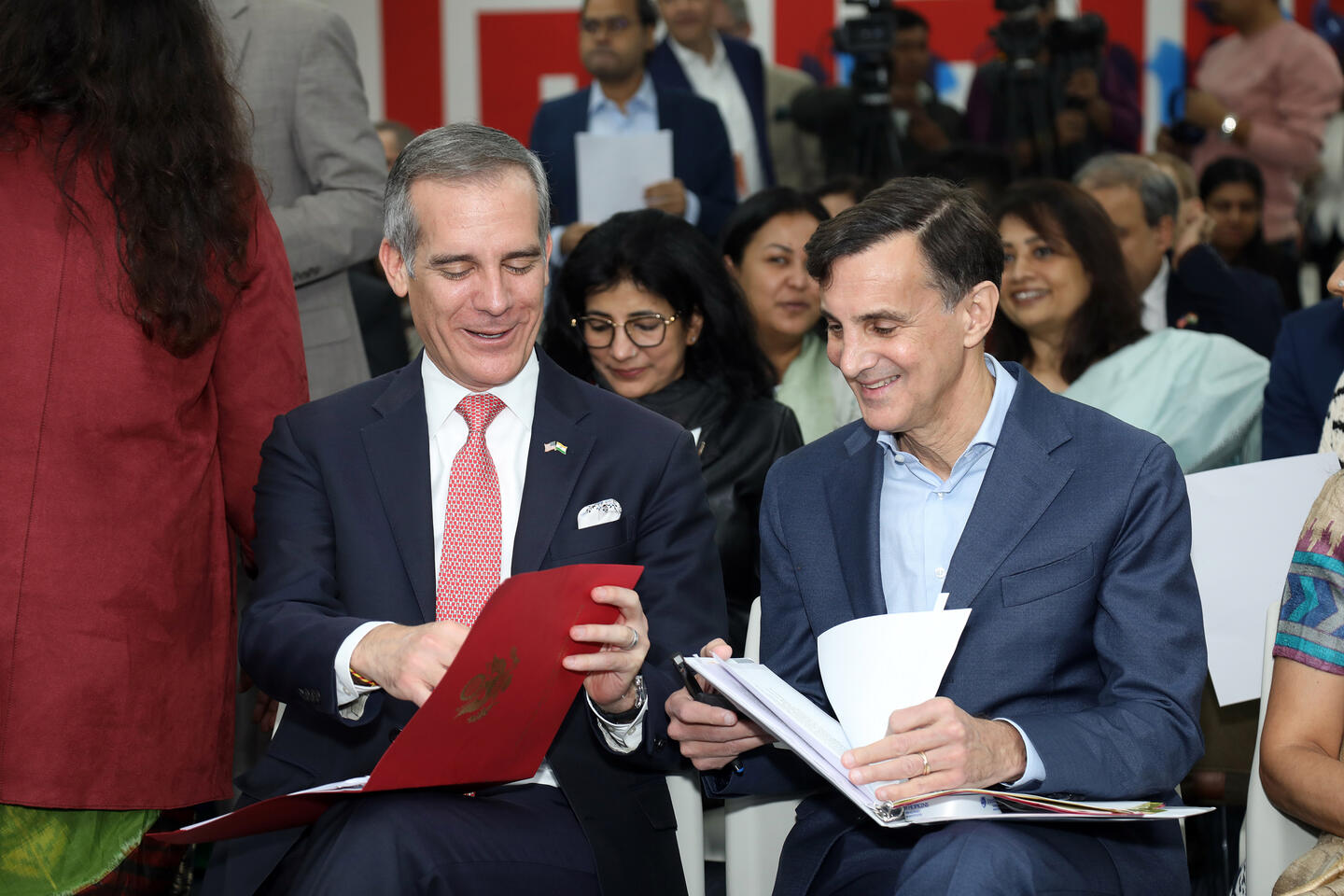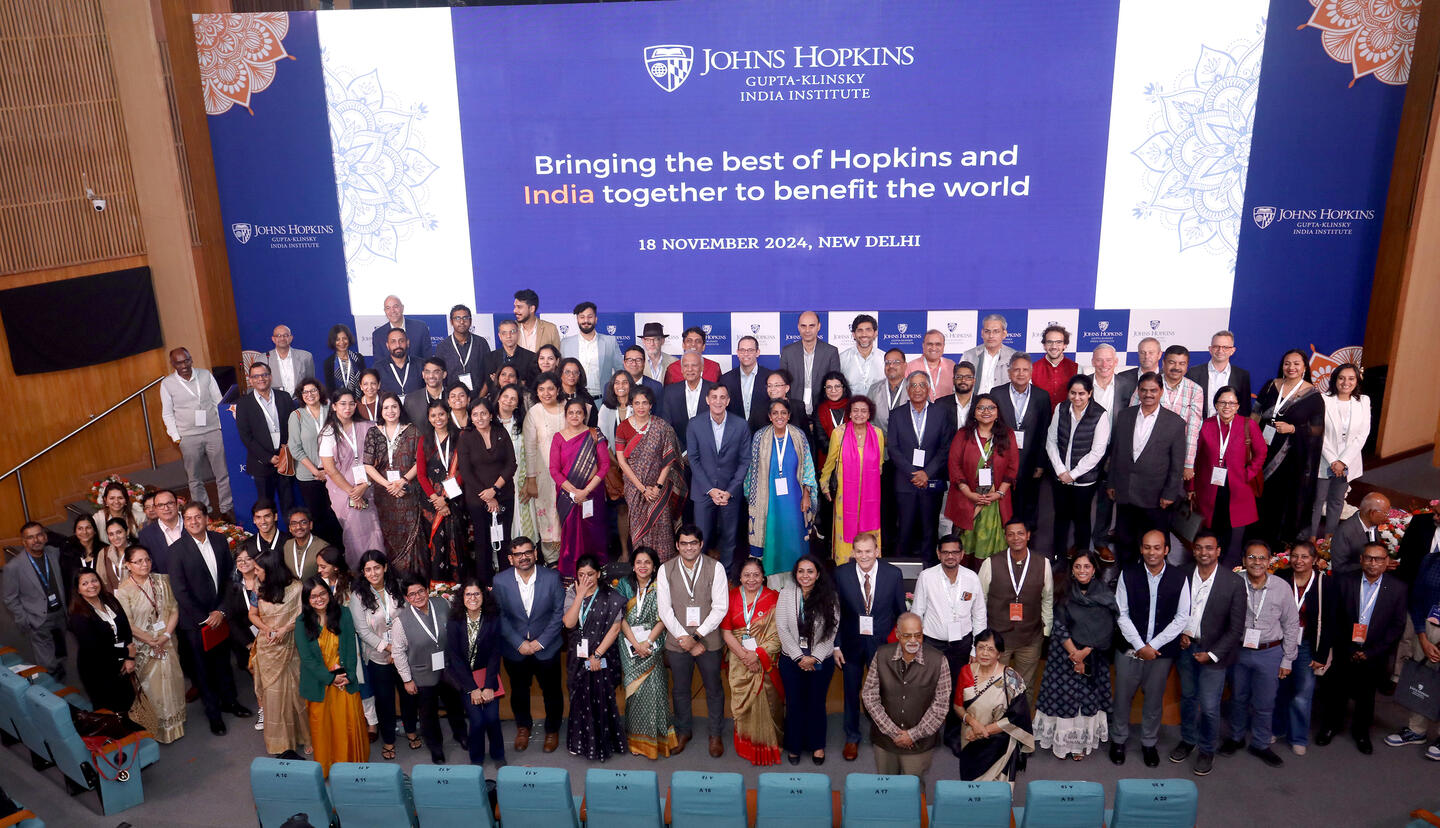- Name
- J.B. Bird
- jbird@jhu.edu
- Cell phone
- 512-750-3512
A delegation of leaders from Johns Hopkins visited four cities in India in late November, announcing university investments in programs that address national priorities for India, including accelerating tuberculosis elimination, promoting gender equality in STEMM (science, technology, engineering, mathematics, and medicine), and administering palliative care in rural areas.
The trip, organized by the university's Gupta-Klinsky India Institute, or GKII, included a visit by JHU President Ron Daniels to New Delhi, India's capital, during which he announced the creation of a national Women in STEMM Fellowship in partnership with the U.S. State Department. Globally, women are underrepresented in STEMM careers, representing just 29% of all STEMM workers, according to the World Economic Forum. Although women represent an estimated 43% of India's STEMM graduates—a figure that surpasses countries with higher GDPs, including the U.S.—they make up only 17% of the research workforce in India. Some of the obstacles that inhibit women's long-term success as STEMM researchers include lack of mentorship support, gender bias, and limited information about research grants.
JHU will design and develop a career advancement program that in its pilot phase will train 40 early-career women scientists for senior research and development roles.
"At Johns Hopkins University, we believe that empowering women in STEMM is essential for advancing global innovation," Daniels said in a statement. "The Women in STEMM Fellowship is designed to help Indian women scientists gain critical research skills, access mentors, and connect with global networks. This fellowship addresses the barriers that often limit women's progress in these fields by providing the support, training, and resources they need to start and sustain their research careers. We are honored to support talented women as they shape a more impactful future leading the R&D ecosystem in India."

Image caption: JHU President Ron Daniels with Eric Garcetti, U.S. Ambassador to India, at the launch event for the Women in STEMM Fellowship in New Delhi.
The Hopkins delegation received widespread media coverage in India, with favorable coverage of its health and science initiatives in The Times of India, Forbes India, The Indian Express, and other national outlets.
Some coverage suggested that Hopkins entered talks to build a campus in India, but the university issued a statement clarifying that this is not the case: "Johns Hopkins deeply values our enduring partnerships in India, and we're excited about the opportunities for ongoing collaborations, which can take many forms, including the research, health initiatives, and educational opportunities for our students that we've announced and explored on this trip. Right now, we are focused on those areas, and do not have specific plans for an expanded physical presence in the country."
During the trip, Johns Hopkins announced investments in a program designed to address pediatric tuberculosis in India, where an estimated 340,000 children under the age of 15 acquire TB each year. While children are estimated to make up about 13% of the total TB caseload in the country, less than half of those cases are diagnosed and treated.
To address this, Hopkins researchers are collaborating with colleagues in India to launch the TB-Free Schools Initiative, based on the success of a cost-effective project in Himachal Pradesh—a state in northern India—that demonstrated an 87% reduction in TB cases in residential schools. The TB-Free Schools Initiative will scale the approach to four additional regions, focusing on preventing, diagnosing, and treating active and latent cases of TB among students attending day schools in India and on providing connections to care, education, and counseling. The effort is a collaboration with the Government of India, the Serum Institute of India, AIIMS Gorakhpur, and the Mukul Madhav Foundation.
"The TB-Free Schools Initiative has demonstrated the power of early detection, treatment, and prevention for dramatically reducing pediatric TB cases," said Amita Gupta, director of the Division of Infectious Diseases at the Johns Hopkins School of Medicine and faculty co-chair of GKII. "This initiative represents a crucial step toward eliminating TB among and strengthens our collective efforts to build a TB-free generation."

The university also signed a memorandum of understanding (MoU) with the Ajit Isaac Foundation to provide technical assistance in launching a nonprofit palliative care center in Tumakuru, a city in southern India. The center will provide quality care for terminally ill patients in rural India and train and support community-based caregivers. The collaboration is being formed to address the difficulties faced by rural caregivers and to help disadvantaged patients with the burdens of treatment.
This joint effort will establish the Tumkur Palliative Care Center, with Hopkins designing and developing a comprehensive palliative care training program including both in-person and online sessions as well as mentorship support for the center's staff.
"We are committed to bridging the health care divide by ensuring that every life, regardless of geography or circumstance, receives compassionate and dignified care," said Nadia Hansel, director of the Department of Medicine at the Johns Hopkins University School of Medicine. "With colleagues in India, we intend to focus on evidence-based approaches that help health care providers and caregivers enhance quality of life for terminally ill patients, providing comfort, empathy and crucial support in the most underserved areas."
During their trip, university leaders also cemented a partnership between India-based Bharat Biotech and JHU's Bloomberg School of Public Health to boost vaccine science research in India. The Ella family, founders of Bharat Biotech, will establish the Ella PhD Scholarship in International Health at JHU in honor of Dr. Krishna Ella's contributions to vaccine production in India and globally. The collaboration is part of a larger Bloomberg School effort on vaccine science, from the development of new vaccines to vaccine safety to strategies for overcoming vaccine hesitancy and misinformation.
"All of us at Johns Hopkins are proud of our almost 100 years of collaborations in India," said Judd Walson, chair of the Department of International Health at the Bloomberg School and an infectious disease expert. "Over this time, the impact of public health improvements in India are incredible, from reductions in child and maternal mortality to improvements in economic empowerment. We look forward to learning from our public health colleagues in India and to continuing to work together to improve lives and livelihoods around the globe."
Posted in Health, University News
Tagged global health, tuberculosis, johns hopkins india institute








